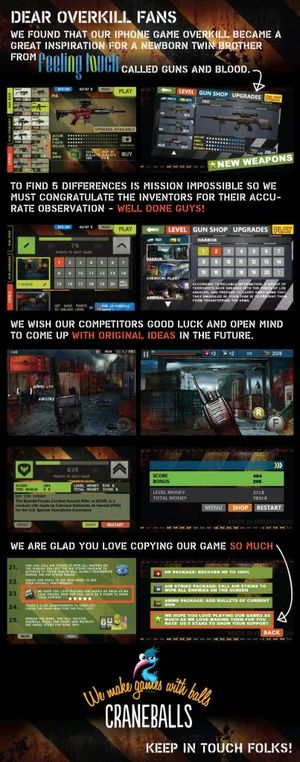 After months of shots across the bow, Craneballs Studios (an app and video game developer) has pulled the trigger on a copyright infringement lawsuit for alleged copying of its popular Overkill first-person shooter game. Craneballs accuses Feelingtouch’s Gun & Blood video game of being an Overkill knock-off and further accuses Feelingtouch of employing a game development strategy that “is based in whole or part on copying of successful games from other developers, sometimes ‘porting’ them to a different operating system before the original publisher.” Craneballs claims that its iOS version of the video game was extremely successful, but that its Android version did not reach the same number of downloads because Feelingtouch ported its copycat version to the Android platform and illicitly cut into Overkill’s success.
After months of shots across the bow, Craneballs Studios (an app and video game developer) has pulled the trigger on a copyright infringement lawsuit for alleged copying of its popular Overkill first-person shooter game. Craneballs accuses Feelingtouch’s Gun & Blood video game of being an Overkill knock-off and further accuses Feelingtouch of employing a game development strategy that “is based in whole or part on copying of successful games from other developers, sometimes ‘porting’ them to a different operating system before the original publisher.” Craneballs claims that its iOS version of the video game was extremely successful, but that its Android version did not reach the same number of downloads because Feelingtouch ported its copycat version to the Android platform and illicitly cut into Overkill’s success.
Not only did Feelingtouch’s Gun & Blood video game become a top twenty Android download, it was also awarded the $200,000 grand prize in Samsung’s Smart App Challenge, a competition intended to reward developers of “innovative apps” for Samsung’s Galaxy Note and Tab devices. The complaint cites an Appaddict.net article stating: “It is sickening to see Samsung Actively rewarding and promoting such behavior and calling it innovative…Instead you are just hurting a hard-working indie developer and sending the wrong message, saying that it’s alright to clone.” When Feelingtouch ignored Craneballs’ cease and desist letter and complaints to Samsung fell on deaf ears, Craneballs was left with no alternative but to file this copyright infringement lawsuit. Click here for a copy of the complaint.
To prevail on its copyright infringement claim, Craneballs must show that 1) it owns the copyright in the allegedly copied work; 2) defendants had access to the work; and 3) plaintiff’s and defendant’s works are substantially similar. Cooling Sys. and Flexibles, Inc. v. Stuart Radiator, Inc., 777 F.2d 485, 491 (9th Cir. 1985). Craneballs can probably establish the first two factors fairly easily, but with respect to substantial similarity, it must show that defendants copied protectable components of its Overkill video game as opposed to the general ideas of a first-person shooter game, e.g. camouflage outfits, selecting different weapons, an artillery depot setting, etc. 17 U.S.C. § 102(b) (“In no case does copyright protection for an original work of authorship extend to any idea, procedure, process, system, method of operation, concept, principle, or discovery, regardless of the form in which it is described, explained, illustrated, or embodied in such work”). Also, when an idea for a game can be expressed in only a limited number of ways, the “merger” doctrine provides that the idea merges with its expression and receives no protection absent identical copying. Data East USA, Inc. v. Epyx, Inc., 862 F.2d 204, 209 (9th Cir. 1998) (elements of karate video game including number of combatants, logistics of the match, common karate moves, and certain background scenes-not protectable because they resulted from “either constraints inherent in the sport of karate or computer restraints.”). Thus the court will need to filter out all of the non-protectable elements of the two games to determine substantial similarity and infringement. To that end, Craneballs has produced the accompanying side by side comparison of the two games illustrating what it believes are copied elements.
The case is Craneballs Studios, LLC v. Feelingtouch, Inc., et al., SACV12-02196 (C.D. Cal. 2012).
 Los Angeles Intellectual Property Trademark Attorney Blog
Los Angeles Intellectual Property Trademark Attorney Blog

